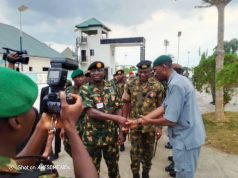By Nkechi Odoma
The name General Tukur Yusuf Buratai might not fade away anytime soon. The name has continued to resonate with the exploits of the Nigerian Army in the prosecution of the war against insurgency in the country. I say this for the principal fact that while he held sway as the Chief of Army Staff; it was indeed a golden era in the annals of the Nigerian Army.
Ambassador TY Buratai, in some quarters, has been described as that Chief of Army Staff that left enduring legacies that redefined the ethos in counterinsurgency operations and civil-military relations. I must add that these two pillars were somewhat the hallmarks of the TY Buratai era in the Nigerian Army. The records are readily available for perusal. Hate him or love him; he was the soldier and the commander at the same time. He was in the trenches with the troops, commissioned projects, and engaged the intellectual community. He was robust and broad in defence of democracy in Nigeria.
The list is endless, and I would classify him in the region of legends that came, saw and conquered. And the awards and recognitions were not in short supply. At some point, it became a harvest of awards from within and outside the country. Needless I mentioned his conferment with the Brazilian Military Order of Merit Award, which is the highest military honours awarded to those military officers that have distinguished themselves in various military endeavours.
Looking at the Nigerian Army before and after him indeed reveals tales of an enduring legacy of unalloyed commitment and passion to ensuring that the Nigerian Army regains its pride of place in the preservation of the territorial integrity of the country. And this much he ensured through the numerous reforms carried out. I beg to state that the overarching objective was to transform the Nigerian Army into a professional force that implements its operational strategies with internationally recognized rules of engagement.
Under TY Buratai, the welfare of officers and soldiers was prioritized, so much so that it boosted the morale of a force that was hitherto laced with lethargy. What some might not know is that this lethargic feeling was primarily responsible for the inability of the Nigerian Army to confront the Boko Haram insurgents.
It’s on record that in less than two years at the helm of affairs, the Nigerian Army gained ascendency over the Boko Haram group. The capture of the once dreaded Sambisa forest was the hallmark of the TY Buratai era.
In my considered opinion, one of the strategies of TY Buratai was the boosting the morale of the officers and soldiers of the Nigerian Army through numerous ways such as prompt payment of salaries and allowances, massive improvement in the living standards in army barracks across the country and the institutionalization of research and policy formulation. For example, under TY Buratai, army barracks experienced a facelift. Command secondary schools were renovated and equipped with the best of facilities. The prestigious Nigerian Military School in Zaria also was not left out through the reintroduction of combat training to boost the students’ morale.
The Tukur Buratai Institute for War and Peace is another legacy project of TY Buratai, designed to enhance training and capacity building for military personnel and civilians alike in counter-terrorism and insurgency, peacebuilding and construction. In this regard, I wish to state that the emphasis on training and capacity building was indeed strategic because, in modern times, tanks and guns are not the only weapons of warfare. This remains exemplary now and in the years to come.
The establishment of the Nigerian Army University was another brilliant one by TY Buratai. I dare say that in the annals of the Nigerian Army, there hasn’t been a period like the TY Buratai era because virtually all facets of the Nigerian Army as an institution were touched.
Therefore, it is not surprising that despite leaving office as the Chief of Army Staff, the name TY Buratai has ceased to leave the lips of officers and soldiers of the Nigerian Army. Let me digress and little. I could say that TY Buratai was somewhat selfish because he went all out to set lofty standards in leadership. This is good in the sense that anyone appointed as Chief of Army Staff must strive to build on these legacies at the risk of being labelled a failure because his name has continued to dominate the discourse in the security circles in the country.
Today, TY Buratai is the Ambassador of Nigeria to the Benin Republic. We must agree that the much regional cooperation in addressing the security challenges in Nigeria is gathering momentum. Nigeria is indeed blessed to have such a personality. My verdict is this; TY Buratai has undoubtedly raised the bar in leadership. And it behoves on those aspiring into leadership positions to take a cue. The lessons are of courage, character and competence. It was indeed an era of the enduring legacy of excellence.
Odoma, a public affairs analyst wrote this piece from Abuja.







